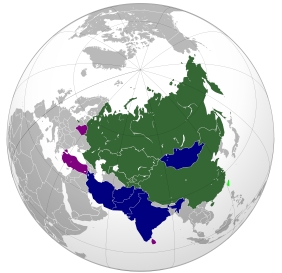Remarks made by U.S. secretary of state Hillary Clinton at Government House in Ulaan Bataar, Mongolia, on July 9, met with no friendly echo from Beijing. Clinton attended an International Women’s Leadership Forum in the Mongolian capital. Liu Yandong, apparently, didn’t attend.

Gate of New China, Zhongnanhai: for political concept deliveries, please use the back door. (Wikimedia Commons, click photo for source.)
But Zhong Sheng, an editorialist with People’s Daily, sensed a loss of face, anyway. Three days after Clinton’s speech, he had sufficiently calmed down to ask questions: “Who gave Americans the right to arrogantly assessing the democracy status of Asian countries?” The editorial warned the U.S. that “preaching human rights and democracy” would marginalize America in Asia.
It’s true: Clinton spoke about democracy. But there seemed to be noone in the place who might have taken offense. Neither Kang Kyung-wha (from South Korea), UN deputy High Commissioner for Human Rights, nor Kim Campbell (Canada), nor Maria Leissner (Sweden), who were all present there. And Mongolia’s president, Elbegdorj Tsakhia, told the audience that
Mongolia honors and is firmly committed to human rights, equal application of law for all and an open and inclusive society, which are the fundamental principles of democracy.
People’s Daily might have criticized the Mongolian president just as well. Warnings that Mongolia might marginalize itself (in its geographic position between Russia and China) might actually have sounded somewhat more logical than levelling the admonition at Washington.

Geo-Politics: Shanghai Cooperation Organization (including China and Russia) – Wikimedia Commons (click picture for source)
But then, this would have amounted to bringing it home to the People’s Daily readership that maybe, democracy and human rights weren’t that exotic in Asia after all – and Zhong Sheng’s editorial was targeted at a domestic audience in the first place.
Targeted at a foreign audience, however, and also prompted by Clinton’s remarks, was an op-ed published by the New York Times, on July 10, i. e. one day later. The op-ed’s authors, Jiang Qing (蒋庆) and Daniel A. Bell, referring to Clinton’s speech in Ulaan Baatar, suggested that framing the debate in terms of democracy versus authoritarianism overlooks better possibilities.
It is easy to discard “political” Confucians like Jiang as nutters. After all, even in just one short op-ed, he and Bell manage to raise fundamental questions concerning their own concept without answering them. While eloquent in putting it to the NYT readership that democracy is [..] flawed in practice, they failed to tell their readers how people who represent sacred, historical and cultural legitimacy should actually be chosen.
Chinese readers may know what they meant – after all, the CCP even defines Olympic torches as sacred -, but the average NYT reader probably isn’t quite that familiarized with sacred things, even as they pop up in the news.
But the NYT’s readers were hardly Jiang’s and Bell’s main target, just as America wasn’t really the main target for People’s Daily’s editorial on democracy and marginalization (see this post’s second paragraph). It simply looks good in Beijing when the New York Times publishes your op-ed, especially when it is in favor of “humane authority”. And if it isn’t logical, it doesn’t really matter, either.

Yellow Cat, Black Cat, White Cat – who cares, if only it’s harmonious
A concept of contending schools – striving for the approval of powers that be: local warlords, the gentry, the emperor, or the CCP – has existed long before Confucianism became a state doctrine. And it still stands. Jiang Qing doesn’t need to convince readers in North America, and he doesn’t even need to convince the Chinese “citizens”, or Chinese scholars. If the CCP buys his concept, that will be good enough.
And while Clinton’s Ulaan Baatar remarks may have been a reason for the New York Times to accept the op-ed, Jiang and Bell may find the situation in China itself comparatively promising for their efforts. As the Chinese economy slows – even if this should turn out to be a short dip, rather than a long-term trend -, China’s leaders may be more receptive of “Confucian” concepts than usual. Economic growth can’t last forever. And Confucianism – or what Jiang wants to sell as Confucianism – is still there.
Unfortunately however, this rubbish does no justice to Confucianism. Many of Jiang’s critics will whole-heartedly agree that Confucianism subscribes to authoritarianism – what Jiang likes it for is exactly what his critics will dislike it for, and this provides all the structure a debate seems to require these days. But the spectrum of Confucianism today – even among Chinese acdemics – is much broader than international publicity for Jiang and Bell seems to suggest. An international audience with an interest in what is going on among Chinese Confucians should pay attention to other Confucian schools, too.
____________
Related
» The Confucius Peace Prize, Dec 9, 2010
» A Continuing Debasement, Useless Tree, Dec 8, 2010
» Jiang Qing on Women and Confucianism, Inside-Out China, June 25, 2008
____________
[…] temporary, too, just as they are at Argentine Radio and TV, and disputes over journalistic content don’t appear to…